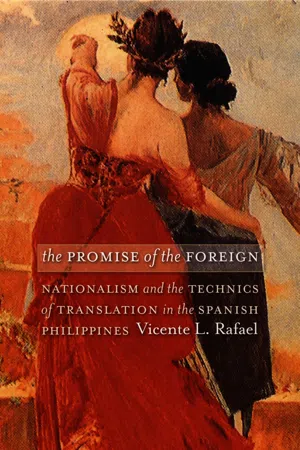
The Promise of the Foreign
Nationalism and the Technics of Translation in the Spanish Philippines
- English
- PDF
- Available on iOS & Android
The Promise of the Foreign
Nationalism and the Technics of Translation in the Spanish Philippines
About This Book
In The Promise of the Foreign, Vicente L. Rafael argues that translation was key to the emergence of Filipino nationalism in the nineteenth century. Acts of translation entailed technics from which issued the promise of nationhood. Such a promise consisted of revising the heterogeneous and violent origins of the nation by mediating one's encounter with things foreign while preserving their strangeness. Rafael examines the workings of the foreign in the Filipinos' fascination with Castilian, the language of the Spanish colonizers. In Castilian, Filipino nationalists saw the possibility of arriving at a lingua franca with which to overcome linguistic, regional, and class differences. Yet they were also keenly aware of the social limits and political hazards of this linguistic fantasy.
Through close readings of nationalist newspapers and novels, the vernacular theater, and accounts of the 1896 anticolonial revolution, Rafael traces the deep ambivalence with which elite nationalists and lower-class Filipinos alike regarded Castilian. The widespread belief in the potency of Castilian meant that colonial subjects came in contact with a recurring foreignness within their own language and society. Rafael shows how they sought to tap into this uncanny power, seeing in it both the promise of nationhood and a menace to its realization. Tracing the genesis of this promise and the ramifications of its betrayal, Rafael sheds light on the paradox of nationhood arising from the possibilities and risks of translation. By repeatedly opening borders to the arrival of something other and new, translation compels the nation to host foreign presences to which it invariably finds itself held hostage. While this condition is perhaps common to other nations, Rafael shows how its unfolding in the Philippine colony would come to be claimed by Filipinos, as would the names of the dead and their ghostly emanations.
Frequently asked questions
Information
Table of contents
- Contents
- Acknowledgments
- Preface
- Introduction: Forgiving the Foreign
- 1. Translation and Telecommunication: Castilian as a Lingua Franca
- 2. The Phantasm of Revenge: On Rizzal's "Fili"
- 3. The Call of Death: On Rizal's "Noli"
- 4. The Colonial Uncanny: The Foreign Lodged in the Vernacular
- 5. Making the Vernacular Foreign: Tagalog as Castilian
- 6. Pity, Recognition, and the Risks of Literature in Balagtas
- 7. "Freedom=Death": Conjurings, Secrecy, Revolution
- Afterword: Ghostly Voices: "Kalayaan's" Address
- Notes
- Works Cited
- Index